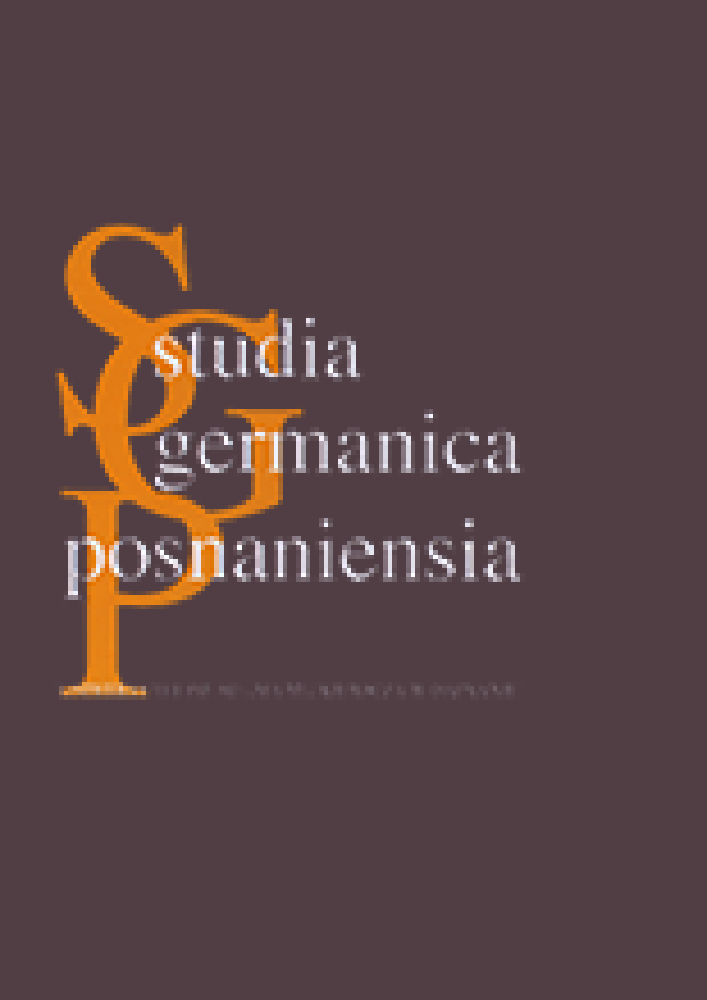Abstract
“There is a tradition of irony in Austria, not only in literature”, said Kathrin Röggla in an interview in 2012; my article considers the assertion as a starting point to an analysis of three novels by contemporary Austrian women authors Flor, Präauer and Simon. The aim is to examine the different patterns of irony by Flor, Präauer and Simon in order to assess what the “Austrian” concept of irony can mean today. Furthermore, I would like to consider the „Austrian“ irony as a specific Austrian cue to express involvement in current political matters.
References
Assmann, A. (2018). Über Erinnerung und Wahrheit. Medien und Öffentlichkeit. Heidelberger Akademie der Wissenschaften. Jahrbuch, 122-129.
Baßler, M. (2005). Der deutsche Pop-Roman. Die neuen Archivisten. München: C.H. Beck.
Birnstiel, K. & Schilling, E. (2012). Einleitung. Postmodernes Erzählen und Konsequenzen für die Theorie. In K. Birnstiel & E. Schilling (Hrsg.), Literatur und Theorie seit der Postmoderne (S. 83-91). Stuttgart: Hirzel.
Booth, W.C. (1975). A Rhetoric of Irony. Chicago, London: University of Chicago Press.
Brüggemeier, F.J. & Niethammer, L. (1978). Schlafgänger, Schnapskasi nos und schwerindustrielle Kolonie. In: J. Reulecke, W. Weber (Hrsg.), Fabrik, Familie, Feierabend (S. 135-176). Wuppertal: Hammer.
Eibl, K. (2004). Animal poeta. Bausteine der biologischen Kultur- und Literaturtheorie. Paderborn: mentis. Flor, O. (2015). Ich in Gelb. Salzburg, Wien: Jung und Jung.
Flor, O. (23. Juni 2015) im Gespräch mit Katrin Hillgruber. „Wer sagt hier „Ich“? Und in welcher Absicht? Abgerufen von http://volltext.net/texte/wer-sagt-hier-ich-und-in-welcher-absicht/.
Freud, S. (1940). Das Medusenhaupt. Internationale Zeitschrift für Psychoanalyse und Imago, Bd. XXV, H. 2, 273-274.
Gauhofer, K. (20 Oktober 2012). Kathrin Röggla: „Enge der Heimat ist nichts für mich.“ Die Presse [online]. Abgerufen von https://diepresse.com/home/schaufenster/salon/1303644/Kathrin-Roeggla_Enge-der-Heimat-ist-nichts-fuer-mich.
Genette, G. (2010). Die Erzählung (3. Aufl.) (A. Knop, Übers.). München: Fink.
Goetz, R. (1986). Irre. Frankfurt a. M.: Suhrkamp.
Herbst, A.N. (2005). Das Weblog als Dichtung. Einige Thesen zu einer möglichen Poetologie des Weblogs. Edition taberna kritika. Abgerufen von http://www.etkbooks.com/wp-content/uploads/etkcontext04_spa5_anh_weblog.pdf.
Hoskins, A. (2011). 7/7 and Connective Memory: Interactional Trajectories of remembering in post-scarcity culture. Memory Studies, 4 (3), 269-280.
Hoskins, A. (2017). The Restless Past: An Introduction to Digital Memory and Media. In A. Hoskins (Hrsg.), Digital Memory and Media: Media Pasts in Transition (S. 1-24). New York: Routledge.
Hutcheon, L. (1994). Risky business: The «Transideological» Politics of Irony. London: Routledge. Japp, U. (1983). Theorie der Ironie. Frankfurt a. M.: Klostermann.
Lang, B. (1996). The Limits of Irony. New Literary History, vol. 27, no. 3, 571-588.
de Man, P. (1969). The Rhetoric of Temporality. In Ch.S. Singleton (Hrsg.), Interpretation: Theory and Practice (S. 173-210). Baltimore: Johns Hopkins Press.
Martens, R. (29 Juni 2015). Wenn Google löschen soll. Hamburger Mediensymposium zum Thema „Konflikte auf digitalen Plattformen.“ Medienkorrespondenz. Abgerufen von https://www.medienkorrespondenz.de/leitartikel/artikel/wenn-google-loeschen-soll.html.
Moser, W. (1984). The Factual in Fiction: The Case of Robert Musil. Poetics Today, vol. 5, no. 2, 411-428.
Muecke, D.C. (1983). Images of Irony. Poetics Today, vol. 4, no. 3, 399-413.
Musil, R. (1978). Der Mann ohne Eigenschaften. Gesammelte Werke. Hrsg. v. A. Frise. Reinbek bei Hamburg: Rowohlt.
Präauer, T. (2016). Oh Schimmi. Göttingen: Wallstein.
Rauen, Ch. (2010). Pop und Ironie. Popdiskurs und Popliteratur um 1980 und 2000. Berlin, New York: de Gruyter.
Rohde-Dachser, Ch. (1991). Expedition in den dunklen Kontinent. Weiblichkeit im Diskurs der Psychoanalyse. Berlin, Heidelberg: Springer.
Röggla, K. (2004). wir schlafen nicht. Frankfurt a. M.: Fischer.
Schlegel, F. (2007). 116. Athenäum-Fragment. In F. Schlegel, Schriften zur kritischen Philosophie 1795-1805. Hrsg. v. A. Arndt. Hamburg: Meiner.
Shearer, J.R. (1999). Shelter from the Storm: Politics, Production and the Housing Crisis in the Ruhr Coal Fields, 1918-1924. Journal of Contemporary History, vol. 34, no. 1, 19-47.
Simon, C. (2016). Wie man schlafen soll. Salzburg, Wien: Residenz.
Terdiman, R. (1985). Discourse / Counter-Discourse: A Theory and Practice of Symbolic Resistance of Nineteenth-Century France. Ithaca, New York, London: Cornell University Press.
White, H. (1986). Auch Klio dichtet oder Die Fiktion des Faktischen. Studien zur Tropologie des historischen Diskurses (B. Brinkmann-Siepmann u. Th. Siepmann, Übers.). Stuttgart: Klett-Cotta.
